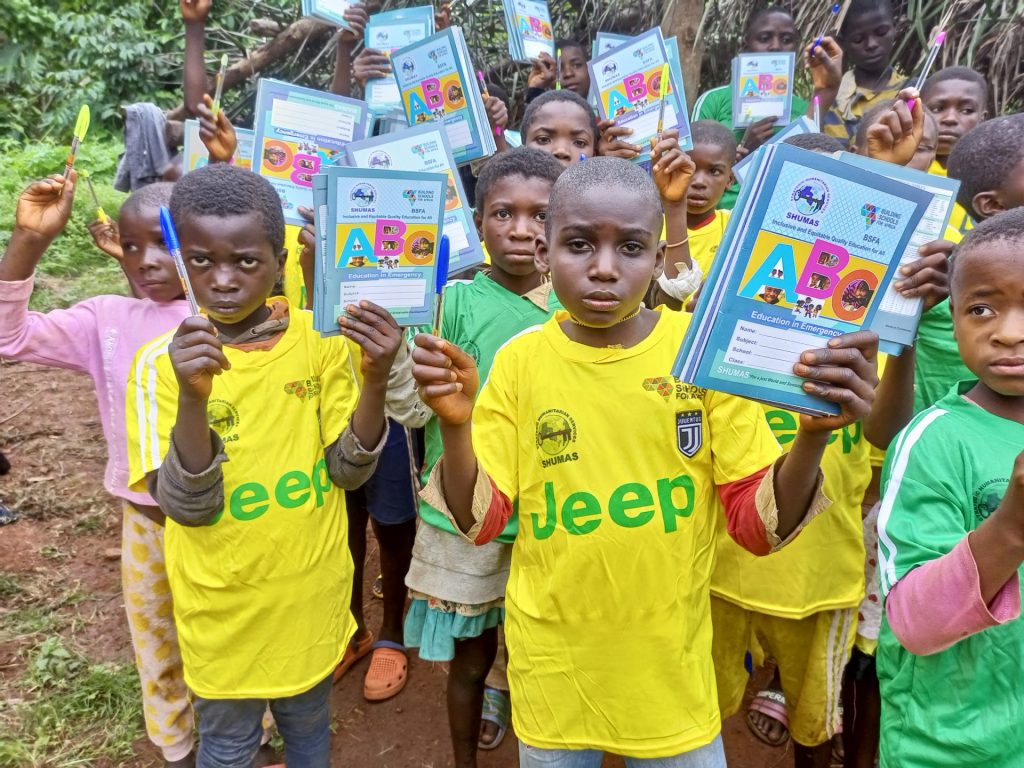Shumas and building schools for Africa education in the emergency project provides teaching learning and sporting materials in Fungom
Over 1237 boys and 1064 girls in 9 Learning Spaces in Internally Displaced Persons settlements and hard to reach villages in Lower Fungom have benefited from the SHUMAS and BSFA Education in Emergency Project. The 9 Learning Spaces are located in communities where children have not had any form of education for close to 5 years since the onset of the Anglophone Crisis which have seen over 80% of schools in the affected regions of the North West and South West remained closed. The benefiting communities of Abar, Aju-Mbuh, Fileeh, Ngun, Kung, Misong, Munken, Fang and Molen in Fungom Sub Division, Menchum Division in the North West Region have remained very elated after receiving the gifts from SHUMAS and Partners. The project is aimed at improving access to education within the crisis situation in the NWSW Regions of Cameroon, with main objective to provide learning opportunities, improve literacy level and livelihood of children in the nine communities in lower Fungom while contributing to the achievement of the SDG on quality education for all. As of December 2019, according to UNICEF, over 83% (5,307 out of 6,379) of schools remained closed, putting 81% (841,330 out of estimated 1,033,000) children out of schools and 73% (21,128 out of 28,866) teachers not reporting to work owing to the life-taking threat posted on them and children as well as attacks on education facilities as a results of the ongoing crisis in Anglophone Cameroon. Parents who had means displaced their children from villages which were mostly affected to attend schools in urban areas in the English speaking Regions where schools were ongoing while others moved to French speaking Regions. The very vulnerable parents and children who lacked the means to seek education out of the very difficult and hard to reach crisis zones have been out of schools for five academic years, this has led to child recruitment into arm groups and early marriages, early and unwanted pregnancies, drug abuse and high level of juvenile delinquency. Due to the extremely high risk and insecurity in Fungom subdivision, people have been forced to move and settled in former farm settlement were no school had existed before (Munken settlement, Misong, Fileeh). Children in these new settlement therefore do not have access to any form of formal education. In other communities where schools exited, they have been shut down since 2016 (Abar, Kung, Ajuh-Mbuh, Molen, Fang and Ngun) due to the ongoing Anglophone crisis, for which education is used as political instrument in the conflict. Some communities have developed strategies to grant children access to education through learning centers. SHUMAS and partners Building schools for Africa in collaboration with these communities worked to provide learning opportunities to the 2301 children in these 9 communities that have been out of school for over 5 years. The project initially targeted 1600 children in 6 communities. However, the demand was so enormous SHUMAS and partners added 3 more communities with the number of benefiting children increasing from 1600 to 2301. The project had the following components; Construction of makeshift structures for learning. This was done by the communities using locally available materials like sticks, grass, bamboos etc. Recruitment and training of facilitators (4 per Learning Space) on education in emergency Creation and training of a Community Education Committee (CEC) for each of the learning spaces made up of the local community leaders for the day to day running of the spaces Recruitment and training of a Psychosocial Support staff (1 per learning Space) to ensure and oversee protection within the learning spaces Provision teaching and learning materials in the form of; books, pens, pencils, color pencils, writing boards, chalk, hand washing buckets, soap, drinking buckets, Emergency toilet slaps, sporting jerseys and balls. Promotion of social cohesion and peace through the sporting activities in the Learning Spaces
